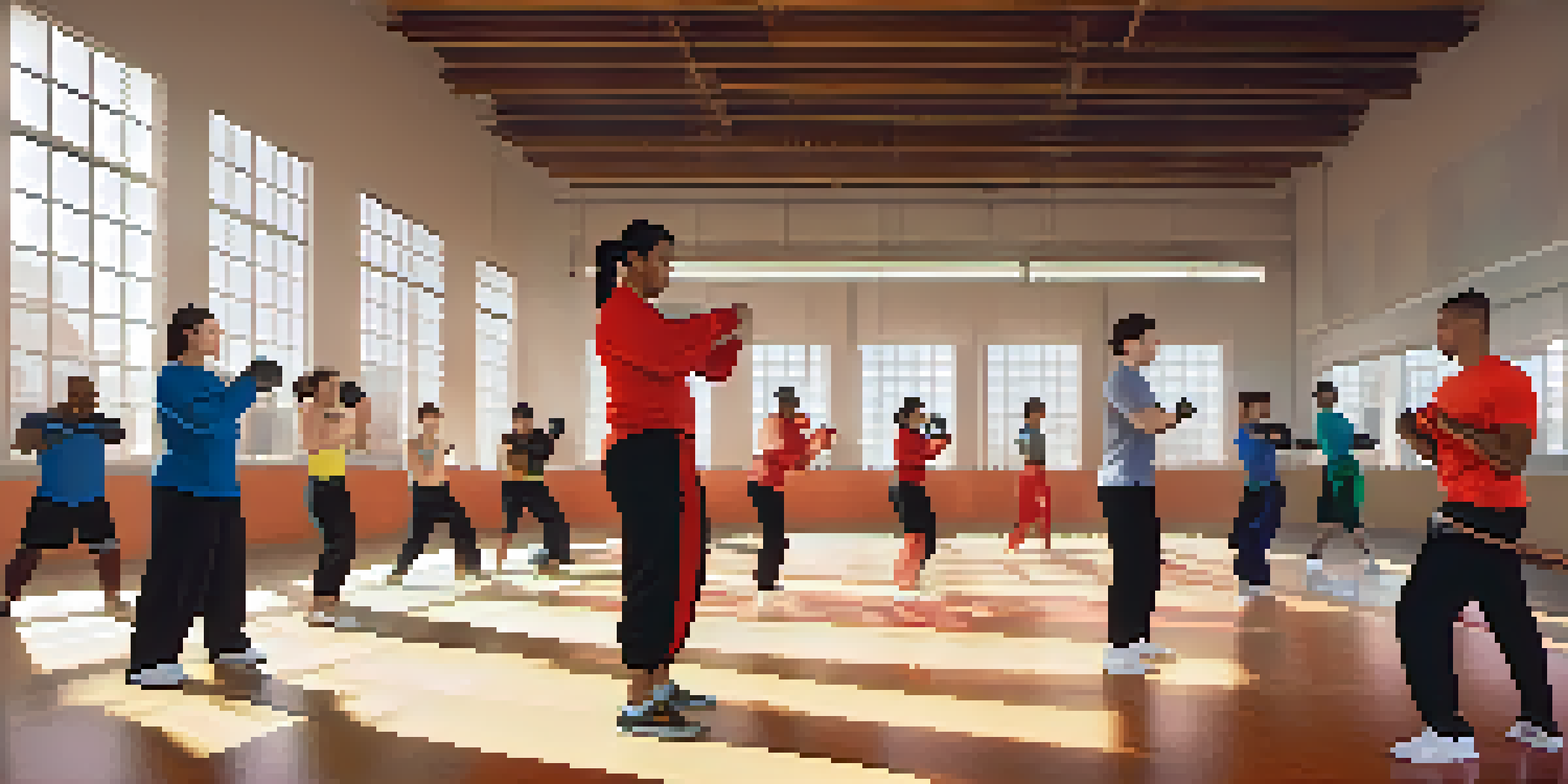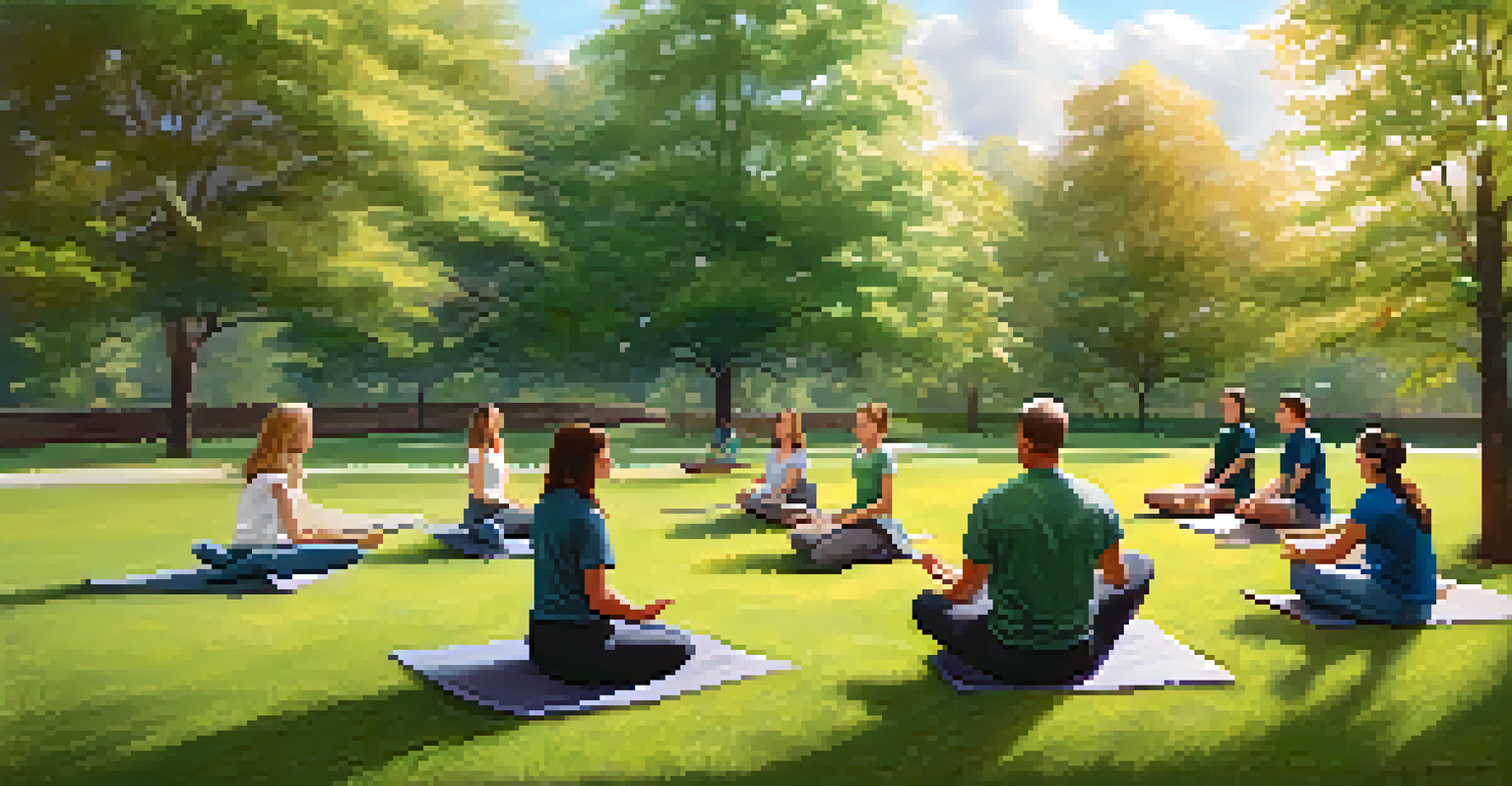Understanding the Role of Self Defense in Mental Well-Being

Defining Self Defense and Its Importance
Self-defense isn't just about physical confrontations; it encompasses the skills and techniques needed to protect oneself from harm. Beyond the physical aspect, it plays a crucial role in empowering individuals, enhancing their confidence and mental resilience. Understanding self-defense means recognizing its importance in both personal safety and overall mental well-being.
The best defense is a good offense.
Imagine walking into a room filled with strangers. With self-defense knowledge, you may feel more at ease, knowing you have the tools to handle potential threats. This sense of preparedness can significantly reduce anxiety, allowing you to focus on enjoying the moment rather than worrying about what might happen.
Moreover, self-defense training often involves learning to assess situations critically, which can translate into better decision-making skills in everyday life. This mental agility is essential not just in threatening scenarios but also in managing stress and everyday challenges.
Building Confidence Through Self Defense Training
One of the most significant benefits of self-defense training is the boost in self-confidence it provides. As individuals learn techniques and strategies, they begin to feel more capable of handling various situations, both physically and mentally. This newfound confidence can permeate other areas of life, from social interactions to professional settings.

Picture someone who once felt timid in group settings suddenly standing tall, articulating their thoughts clearly and assertively. Self-defense training fosters this transformation by instilling a sense of agency over one's body and environment. The ability to defend oneself can shift one's mindset from vulnerability to empowerment.
Self Defense Boosts Confidence
Learning self-defense techniques empowers individuals, enhancing their self-confidence and ability to handle various life situations.
Additionally, the supportive community often found in self-defense classes plays a vital role in confidence-building. Training alongside others fosters camaraderie, allowing participants to share experiences, challenges, and triumphs, which can enhance motivation and self-esteem.
The Connection Between Safety and Mental Health
Feeling safe is a fundamental aspect of mental well-being. When individuals perceive threats, even if they are not immediate, it can lead to heightened anxiety and stress. Learning self-defense techniques can provide a sense of security, helping to alleviate those feelings and improve overall mental health.
Self-defense is not just a physical skill; it's a mental strategy and a way to empower yourself in daily life.
Consider the difference between someone who feels defenseless versus someone equipped with self-defense skills. The former may constantly scan their environment for threats, leading to chronic stress, while the latter enjoys life with a relaxed mindset, knowing they can respond if necessary.
This sense of safety can encourage individuals to engage more fully in social activities, pursue new opportunities, and develop healthier relationships. By removing the constant fear of potential harm, one can focus on personal growth and happiness.
Self Defense as a Tool for Stress Relief
Engaging in self-defense training can serve as an excellent outlet for stress relief. The physical activity involved, whether it’s practicing strikes or sparring, allows individuals to release pent-up energy and tension. This release can be incredibly therapeutic, promoting relaxation and mental clarity.
Think of self-defense training as a form of moving meditation. As participants focus on techniques and movements, they often find their minds quieting, allowing them to escape from daily stressors. This shift in focus can lead to a boost in overall mood and a sense of accomplishment.
Mental Well-Being Through Safety
Acquiring self-defense skills provides a sense of security that alleviates anxiety and promotes overall mental health.
Furthermore, the discipline and structure of self-defense classes can instill a sense of routine and purpose. Regular training sessions provide individuals with something to look forward to, fostering consistency and stability in their lives, which is essential for maintaining mental well-being.
Fostering a Sense of Community and Support
Self-defense classes often create a unique sense of community among participants. This supportive environment encourages individuals to share their experiences, fears, and triumphs, fostering connections that can significantly enhance mental well-being. Feeling understood and supported can alleviate feelings of isolation or anxiety.
Imagine walking into a room where everyone shares common goals, whether it's learning techniques or improving personal safety. The encouragement and camaraderie found in these spaces can be incredibly uplifting, creating lifelong friendships and a network of support.
Moreover, sharing challenges and successes in a self-defense context can build resilience. Participants learn that they are not alone in their struggles, which can empower them to face not only self-defense scenarios but also life's challenges with a more positive outlook.
Empowerment Through Knowledge and Skills
Knowledge is power, and this is especially true in self-defense. Understanding how to assess risks, recognize threats, and respond effectively builds a strong foundation of empowerment. This empowerment translates to mental well-being, as individuals feel more in control of their lives.
Learning self-defense techniques provides individuals with a toolkit for navigating potential dangers. This understanding fosters a proactive mindset, shifting from a reactive approach to one that embraces preparedness and resilience. Knowing what to do in various scenarios can significantly reduce fear and anxiety.
Community Support in Training
Self-defense classes foster a supportive community, helping participants share experiences and build resilience together.
Additionally, empowering oneself through knowledge extends beyond physical techniques. It encompasses understanding personal limits, setting boundaries, and advocating for oneself, all of which are essential for mental health and personal growth.
Overcoming Fear and Building Resilience
Self-defense training often involves facing fears head-on, whether it's the fear of physical confrontation or the fear of failure. Confronting these fears in a safe and structured environment helps individuals develop resilience. This process fosters growth, teaching participants that they can overcome challenges, both on and off the mat.
Picture someone who once hesitated to engage in physical activities, now tackling sparring sessions with determination. Each small victory in self-defense training builds confidence and resilience, demonstrating that fears can be managed and overcome.

Furthermore, the lessons learned in self-defense extend beyond physical encounters. Participants often find that the skills and mindset cultivated in training help them navigate other aspects of life, from workplace challenges to personal relationships, reinforcing the idea that resilience is a valuable life skill.
Conclusion: The Holistic Benefits of Self Defense
In conclusion, the role of self-defense in mental well-being is multifaceted and profound. It not only equips individuals with the skills to protect themselves but also fosters confidence, community, and resilience. These components are essential for maintaining mental health and navigating life's challenges.
By engaging in self-defense training, individuals can experience a sense of empowerment that positively impacts their overall outlook on life. The benefits are not limited to physical safety; they extend into emotional and psychological realms, creating a well-rounded approach to well-being.
Ultimately, understanding the importance of self-defense can inspire individuals to take action, not just for their safety but for their mental health. As we prioritize self-defense, we pave the way for healthier, more confident lives.